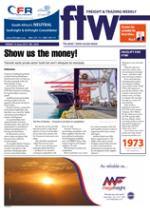est Africa has
become one
of the most
viable regions
for companies wanting
to expand and grow their
operations in Africa.
According to Sharmeni
Varathaiah, head of sales for
NileDutch in Johannesburg,
Africa has always been a
part of the company’s DNA
but there is a major focus on
growing and expanding its
West African footprint at
present.
“We have grown our
services into Angola – now
shipping weekly container
loads of cargo from Europe,
South America, China
and South Africa into
Angola – as well as the
DRC, Nigeria, Ghana,
Benin, Togo and Gabon.”
The company has also
decided to increase its
West African reach by
introducing new services
into Equatorial Guinea,
with dedicated feeder
services from Point Noire.
“This offers our
customers in this region
the best in transit times
and efficiency. At the same
time our focus remains
on improving our current
services into West Africa,
while we are also starting to
look at prospects in the East
African market.”
Varathaiah said it was
all about innovating
services, increasing sailing
frequencies and investing in
new vessels.
“NileDutch recently
purchased 500 brand new
reefer containers and the
container f leet reached
100 000 TEUs, a major
milestone for the company,”
she said.
Commenting on West
African operations,
Varathaiah said the
region came with its
own challenges of which
congestion and delays
at several of the ports
remained the biggest.
“Not only does it affect
sailing schedules, it also
adds significantly to costs.”
But, said Varathaiah,
geared vessels ensured they
were always working even
when ports were not.
“Getting into some of the
river ports with shallow
draughts is one of the
challenges we regularly
face.”
She said that while
Luanda port congestion
had increased, NileDutch
was not affected as it could
berth at 5M terminal.
Finding ways of
overcoming these challenges
is the secret to success in
the West African market,
she added, where quick
transit times and minimal
costs remain the objective of
NileDutch.
INSERT & CAPTION
Congestion and
delays at several of
the ports remain the
biggest challenges
– Sharmeni Varathaiah

